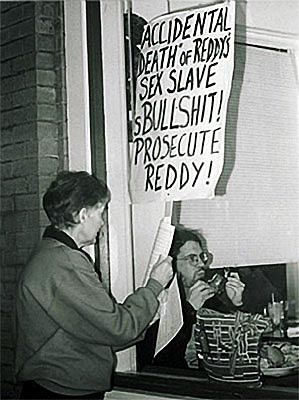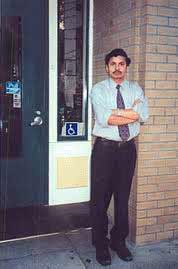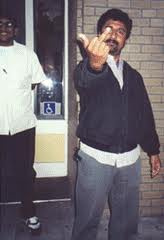WHY DID CHANTI DIE? AN ACTIVIST TAKES ON BERKELEY LANDLORD FOR ALLEGED SEX-TRAFFICKING
For more information about the Lakireddy Bali Reddy case please see the section of this website devoted to this case. Click here.
~~~~~~~~~~~~~~~~~~~
It was a rainy Saturday on January 22, 2000, when I read in the local newspaper that a 62-year-old East Indian man called Lakireddy Bali Reddy — the richest landlord in Berkeley, California (aside from the University of California) — had been accused of bringing at least three young girls from India for sex.“(4) Sex” in this context means rape, for the two girls were under 18 years of age (the criterion for child status in California). In the United States, sexual intercourse between adults and children or adolescents under the age of consent constitutes statutory rape, which is punishable by law.
Sexual Slavery
In August 1999, 17-year-old Chanti Prattipati and her 15- year-old sister were trafficked from Vijawada — Reddy's hometown in the south Indian state of Andhra Pradesh — to his adopted home in Berkeley. The third 20-year-old young woman had been trafficked earlier that year. (The media has avoided naming two of these individuals to preserve their anonymity.) Berkeley City Attorney Manuela Albuquerque, who is also East Indian, described Vijawada as “like a company town in which (Reddy) is the president of the family-owned corporation.”(4) According to one source, “nearly the entire village is financially dependent on (Reddy).”(7)
Albuquerque characterized the families of the Prattipati girls as belonging to “the lowest of the low castes.”(4) The girls had worked as cleaners of Reddy's properties in Vijawada from a very young age. The 15-year-old told the authorities that she had been given to Reddy by her poverty-stricken parents some time ago(9). Presumably, this applies to her sister as well. Perhaps their parents believed that their daughters would have a better life in the United States than they could possibly have in Vijawada.
The prosecutors stated that Reddy “had been sexually molesting [raping] the girls for the past four years.”(2). The 15-year-old told the Berkeley police and agents of the Immigration and Naturalization Service that she had been having sexual intercourse with Reddy in India “since she was turned over to him by her parents at the approximate age of 12.”(3)
The 20-year-old reported to these same authorities that “her father had sold her to Reddy because of economic hardship when she was 14. She said she worked for him at property he owns in India for five years until he brought her to Berkeley last year [1999].”(3) According to her affidavit, “the primary purpose for her to enter the U.S. was to continue to have sex with Reddy.”(3) She also reported that “Reddy had sex with both of the [younger] girls frequently in front of her”(3).
Because the three girls were trapped in an exploitive relationship with Reddy — sold or given to Reddy by their parents, repeatedly raped by him, unable to speak English, economically dependent on him, isolated and disconnected from other Berkeley institutions (e.g., high school), devoid of visible alternatives while living under the watchful eye of a powerful, controlling patriarch, too vulnerable to report their situations to the police and perhaps fearful about his power over, and ability to retaliate against, their families in India — they qualify as sex slaves. The fact that Reddy also exploited the girls for their labor requiring them to work at his popular downtown Pasand Madras Cuisine Restaurant as well as clean and paint some of the numerous buildings he owns, added to their entrapment. Furthermore, as Albuquerque pointed out, Reddy provided all their food, their clothing, and their livelihoods.(2)
The Charges
Reddy was charged with eight felony counts, “including importing immigrants for immoral purposes and transporting minors for illegal sexual activity.” His 30-year-old son, Vijay Lakireddy, “was charged with three [felony] counts, including submitting fraudulent visa applications.”(1) According to prosecutors, father and son had “petitioned immigration officials for visas on behalf of workers they claimed would be employed” as high-tech employees in one of their companies. “Instead, the workers were employed at Reddy's apartment buildings, office buildings and restaurants.”(1) Reddy and his son were also charged with falsifying documents for numerous other East Indians who became Reddy's indentured servants in the Pasand Restaurant. Since Reddy has been a resident of the United States for over 40 years, and since he opened the Pasand Restaurant in 1975, this illegal behavior by Reddy has been going on for a considerable time.
According to one source, if Reddy is convicted on all Federal Grand Jury indictments, he could face “spending the rest of his life behind bars.” (8).
Chanti's Untimely Death
On November 24, 1999, Chanti Prattipati died from carbon monoxide poisoning in an apartment Reddy owned and in which he had housed her and his other two sex slaves. Although the police concluded that her death was accidentally caused by a blocked wall heater vent, (3) Reddy's subsequent behavior reveals that he wished to hide Chanti's death, as well as her sister's unconscious state as a result of the carbon monoxide leak, and his relationship with his 20-year-old sex slave.
Several newspaper and other anonymous accounts reported that when Reddy discovered the poisoned girls in his apartment, he failed to call the police or an ambulance. Instead, with the help of some of his employees, he dragged their bodies out of the building and into his truck. They also tried to force the 20-year-old woman into his truck. Having been spared the carbon monoxide poisoning, she screamed and vigorously resisted their attempts, thus alerting a passerby into asking Reddy what he was doing. “Mind your own business!” he told her. She responded to his rudeness by flagging down two motorists and asking them to call 911. A call by one of them brought the police to the scene before Reddy could make his getaway. But for the intervention of this passerby, Reddy might have succeeded in his presumed desire to dispose of the girls.
Reddy Arrested
Reddy was subsequently arrested and incarcerated. However, despite opposition to any offer of bail — including my own courthouse picket — the judge permitted him to buy his freedom by paying whatever percentage the court required of a 10-million-dollar bail. This amount was peanuts for Reddy, a multi-millionaire who earns over $1,000,000 a month from his Berkeley rental properties alone. After avoiding apprehension for some time, Reddy's son Vijay was also finally arrested. A $500,000 bail also proved to be no obstacle to him.
Is This Femicide?
Given the condition of the Prattipati sisters, it is unlikely that Reddy would have been able to arrange for their immediate flight to India. My suspicion is that he may have intended to bury all three of his sex slaves — after killing the 20-year-old. Hence, I think of Reddy as a possible “would-be perpetrator” of femicide (the killing of a female by a male because she is female). When the police finally arrested Reddy in his home, they found plane tickets to India for himself and his two sex slaves, a suitcase full of gold, and $55,000 in cash.(10) Clearly Reddy was only apprehended in the nick of time before his planned escape two days later. However, in the week following Reddy's arrest, the police received a report “that eight women who worked at Reddy's restaurant in Berkeley were sent back to India”(2) — presumably to prevent them from talking to the police.
Whether or not I am correct about Reddy's possible femicidal intentions, I believe it to be irrefutable that he is guilty of negligent homicide for failing to repair the approximately 66 carbon dioxide leaks in the apartment building he owned and in which his three young sex slaves shared an apartment. However, the police have never, to my knowledge, publicly charged Reddy with negligent homicide. Instead, they have consistently exonerated him by describing Prattipati's death as “accidental” without attempting to justify their verdict. Shockingly, Bay Area journalists have rubberstamped the police's conclusion without explaining to the public why they have chosen not to question the police's failure to charge Reddy with negligent homicide.(6)
My Reaction
I was so appalled to learn that sexual slavery had been going on in the community where I live, that I decided to initiate a boycott of the Pasand Restaurant by picketing on the sidewalk in front of it. I immediately set about trying to find other women to join me in this action. When my efforts were unsuccessful, I decided to picket alone.
For many years I have combined my scholarly research on sexual violence and abuse of females by males with political activism to combat these forms of patriarchal oppression, but I had never been a lone picketer before Saturday January 22. Encouraged by remembering an acquaintance who had picketed alone for many months, I used the remainder of that afternoon preparing an educational leaflet to hand out, and painting a large sign that read “PASAND'S OWNER REDDY TRAFFICKS IN GIRLS FOR SEX; BOYCOTT PASAND!” (This was the first of many.) That was many months ago, making this the longest running picket that I've ever engaged in.
I started my picket in the pouring rain by plastering my sign against a Pasand window for the diners to read. It wasn't long before a member of the staff pulled down the blind to hide my placard from the customers. I subsequently moved from one window to the next, and so on, until all the blinds were closed. Then I stood outside the blind-free glass door waving my sign. This became my modus operandi at the beginning of all my pickets.
Angry members of Pasand's managerial staff — most of whom are Reddy's real or pseudo-relatives, I've been told — ordered me to get off their property immediately (i.e., the small space in front of their door that provided shelter from the pouring rain). I infuriated them by repeatedly returning to the sheltered spot. “We'll call the police,” they threatened angrily. “Go ahead!” I responded. Such threats did not scare me. From past experience I knew that the police would give me plenty of time to decide if I wanted to obey or disobey their orders. Furthermore, my outrage at the crimes Reddy had been charged with made me willing to be arrested if I judged it to be an effective tactic. But not on my first night!
While by far the majority of passersby have been supportive of my action (our action-when a feminist activist called BJ subsequently joined me for long periods between her trips out of town, and when others joined for a night or two), quite a few have also questioned my motives in picketing the restaurant. “Who is paying you?” afew hostile individuals have wanted to know.
My Motivation
I felt impelled to demonstrate my abhorrence of Reddy's trafficking, enslavement, and routine rape of underage girls because I am a feminist who opposes all forms of sexual exploitation. Over the past 30 years, I have participated in actions in support of incest and rape survivors as well as actions to protest the murder of prostitutes (femicide), wife abuse, pornography and pornography-related sexual violations, and sexual trafficking in all its forms (e.g., sexual tourism, mail order brides, and escort services).
I have continued to picket frequently and to hand out information about the charges against Reddy over many months in the hope that the Pasand Restaurant would be forced to close down. I chose to urge a boycott of this restaurant because it seemed to be the most effective strategy for a small number of protesters. Despite Reddy's wealth, I believe that his loss of revenue from a successful boycott would be the most tangible sign that the Berkeley community considers the charges against him to be both credible and extremely serious.
I have persisted with my protest because I am certain that it has been extremely effective in educating many people and in substantially decreasing the number of Pasand customers. I consider the fury directed at me by Reddy's relatives and their allies as a measure of the success of this action. It is empowering to know that such a grassroots campaign by one or two individuals can be so effective.
Finally, by drawing attention to Reddy's trafficking in young girls to Berkeley, I hoped to inform people about the growing problem of sex slavery in the United States and throughout the world.
The Reactions of Passersby
“Do you know about the charges of sexual slavery against the owner of this restaurant?” is my typical question to the hundreds of passersby as I hold my sign in one hand and hand out leaflets with the other. Many have told me that they already know about the case. Some tenants of Reddy, who owns over 1,000 apartments that he rents in a desperately tight housing market, have said that they are too afraid to talk to me in case Reddy's relatives in the Pasand Restaurant recognize them causing Reddy to retaliate by evicting them.
Many of the passersby are critical of Reddy and have voiced comments like, “He's a scumbag, and I'd never eat at his restaurant!” or, “I don't eat there anymore.” “It's such a pity because I loved their food.” A young East Indian passerby told me that his reaction to the Reddy case was “shock and dismay that someone of his standing with his responsibilities would do such a thing” (i.e., traffic in young girls). “It's a blemish on our community,” he added. “In India, this sort of thing happens all the time-because of poverty and past practices,” he continued, “but I don't know any Indians here who support Reddy's behavior.”
Passersby have often said, “Thanks for doing this!” “I support you!” or, “I'm so glad to see you here!” Sometimes they ask, “Why aren't there more people out here?” Why indeed! This is the question I keep asking myself, my friends, feminist public speakers, etc. No one has answers that satisfy.
A few supporters who have passed by have volunteered to join me. I've thanked them enthusiastically and pointed out my name and phone number on my handout. I have sometimes even promised to make an extra sign if a volunteer has shown reluctance to do this task. But only one of these individuals — an East Indian man — ever showed up, and he was so uncomfortable picketing that he excused himself “to make a phone call” after less than 15 minutes, nevermore to return.
There are also many passersby who've read or heard about the case, but who don't realize Reddy's relationship with the Pasand Restaurant. On learning that he is an owner, some look horrified and assure me that they won't eat there. This is also true of many of the customers whom I approach after they have dined there saying, “Please read about Mr. Reddy — the main owner of the restaurant where you've just eaten.” Similarly, many of those who see my sign through the window explain, “We didn't realize this was the place. We certainly won't come back here!”
Others have said: “You should've been here before we went in, then we wouldn't have eaten here.” Several of the would-be customers who I've approached as they entered the restaurant don't want to be diverted from their choice of eating place, but many are still willing to take a handout to read over dinner. Others reluctantly change their plans and go to eat elsewhere. Sometimes this takes a lot of persuasion.
Some customers who know about the charges against Reddy and one of his sons respond to my question as they enter or exit the Pasand by saying, “I like the food;” “The people here are my friends;” “This is America where a person is innocent until proven guilty!” Some are downright hostile: “You bitch! Don't you have anything better to do?!” “Get a life!;” “You're outrageous! What gives you the right to be the judge and jury?!”
Some of the passersby made similarly hostile comments. Some yell epithets at me, and barrage me with refutations of my arguments. “If you weren't there to witness what happened, then you've no right to accuse Reddy of such crimes!” One furious passerby destroyed a picket sign and stuffed it into the roadside garbage bin. Another tried to knock the sign out of my hand. A few took the handout then crumpled it up with contempt.
In general, however, picketing the Pasand Restaurant has been a fascinating experience, full of surprises and extremely educational. I have learned so much about the Reddy case from people on the street, including a few tips that I passed on to the police. Perhaps the most significant and oft-repeated claim by passersby and others is that the three girls are not the first sex slaves that Reddy has trafficked from India. Indeed, several individuals told me that they had seen evidence of this for a long time. Some of these informants were skeptical that the police could possibly have been ignorant about this fact.
Because of the widespread media coverage of this scandal in the early months, it often takes little effort to convince passersby, customers and would-be customers, about the merits of boycotting the Pasand Restaurant.
The Reactions of Reddy's Relatives
After Reddy paid his bail, the judge confined him to his brother's house in Merced, so Reddy was not to be seen at the Pasand Restaurant. His oldest son Prasad Lakireddy, however, seemed to be a permanent fixture there. Almost invariably he stood outside the restaurant door in the evenings when I picketed — with or without other picketers. Frequently, one or two of Reddy's other relatives joined him. He was polite to me at the beginning of my boycott campaign, in contrast to his younger brother, Vijay Lakireddy, who fortunately came to the Pasand much more rarely than Prasad. Vijay was almost always belligerent and verbally abusive toward me and other picketers — increasingly so over time. Vijay, who cursed me and any other picketers as “Bitch” this and “Bitch” that, also repeatedly denounced us as racist. Both he and Prasad appeared to believe that we were picking on them because of their East Indian appearance, completely failing to hear our oft-repeated point that we were protesting the way Reddy had victimized young East Indian girls.
Prasad also became increasingly combative and insulting over time, but once in a while he was quite friendly, humorous, and even kind to me. For example, he occasionally said “Goodnight,” or “Take care,” when I ended my picket for the evening, or when I was still picketing after the restaurant's closing time. Sometimes we chatted amicably and laughed together. On two occasions he even stopped two passersby from relentlessly harassing me. But more often he engaged in long, loud, tirades — repeatedly accusing me of being a liar, a propagandist, of hurting innocent people at the restaurant, of being an opportunist who was picketing in order to sell my books and to enhance my reputation, and so on.
I am Sued
Vijay frequently told me, “We're going to sue your ass for what you're doing to us!” He and his cousin Sidhardha Lakireddy videotaped me from time to time and Prasad started writing notes about me. Then on May 26, I was served with a civil suit charging me and Does 1-50 (i.e., up to 50 additional as yet unnamed picketers) with various kinds of wrongful behavior. One of the funniest is the accusation of greatly impairing the Reddys' earning capacity. “Unless Defendants (i.e., me and up to 50 Does) are enjoined from continuing their course of conduct, Plaintiff will suffer irreparable injury, as the usefulness and economic value of Plaintiff's property will be substantially diminished.”
This charge is, of course, a tribute to the success of the boycott campaign — a charge with which I heartily agree! Although false, another amusing charge is that I was motivated by financial gain to “inject [my]self into a controversy involving L.B. Reddy, for the purpose of increasing [my] name recognition and notoriety, for the purpose of enhancing [my] stature as an expert and increasing [my] business.”
As of today, I am the only picketer who has been sued. After stalling for a while, my pro bono attorney's only concession to the Pasand owners was to agree that I would stand at least five feet away from the door of the restaurant. This token compromise satisfied the Reddys that they had at least won this small victory.
The Latest on the Case
As of October 18, the American Civil Liberties Union has agreed to assist a team of attorneys who will represent Reddy's victims.(5) However, the ACLU declined to reveal the number of victims to be represented. The number of individuals indicted in the case could also be augmented by a federal grand jury. No trial date has been set, but a hearing before a U.S. District Judge is scheduled for October 24.(5)
Conclusion
Sex trafficking hurts women and girls both individually and collectively. The brutal reality of the sex trade is that destitute women and girls from poor countries are being sold as commodities in a sexual marketplace designed for the pleasure and profit of affluent men. Poverty fuels the recruitment of women by traffickers in sexual slavery as it is often the only means left to many women seeking to feed their families and themselves. I intend to continue picketing the Pasand Restaurant to draw attention to this flagrant example of sex trafficking in my community.
References
(1) Lisa Fernandez, Lakireddy case may produce new charges, The Berkeley Voice, September 15, 2000, pp. A1, A8.
(2) Debra Levi Holtz, Berkeley sex suspect is released on bail, San Francisco Chronicle, January 26, 2000, pp. A13-14
(3) Debra Levi Holtz & Chuck Squatriglia, Berkeley landlord held in sex scheme, San Francisco Chronicle, January 20, pp. A17, A22.
(4) Debra Levi Holtz & Chuck Squatriglia, Berkeley landlord depicted as overlord of India village, San Francisco Chronicle, January 22, p. A8.
(5) Henry K. Lee, ACLU in Berkeley landlord case, San Francisco Chronicle,October 18, 2000, p. A21.
(6) Diana E. H. Russell, Questions about the death of young sex slave in Berkeley Remain, San Francisco Chronicle, April 6, 2000, p. A27.
(7) Renada Rutmanis, Seven women missing, The Daily Californian, pp. 1, 7.
(8) Judith Scherr, Landlord may spend life in prison, Berkeley Daily Planet,February 3, 2000, pp. 1, 3.
(9) Matthew Yi, Tale of two worlds, San Francisco Sunday Examiner, February 6, 2000, pp. A1, A12-13.
(10) Jim Herron Zamora & Simar Khanna, $10 million bail in sex case, San Francisco Examiner, January 26, 2000, pp. A1, A12.
Photographs:
1. Lakireddy Bali Reddy being escorted out of jail after paying $10,000,000 bail. Darryl Bush, San Francisco Examiner.
2. Diana Russell, showing her picket sign to customers in Pasand Restaurant. Photo taken by Margaret Benes.
3. Vijay Lakireddy, out on bail, giving me the finger outside the Pasand Restaurant. Photo taken by Diana Russell.
2000, p. A6.
Acknowledgment
I am grateful to Tammy Gordon for her editorial assistance.
~~~~~~~~~~~~~~~
For more information about the Lakireddy Bali Reddy case please see the Women Against Sexual Slavery section of this website. Click here.





